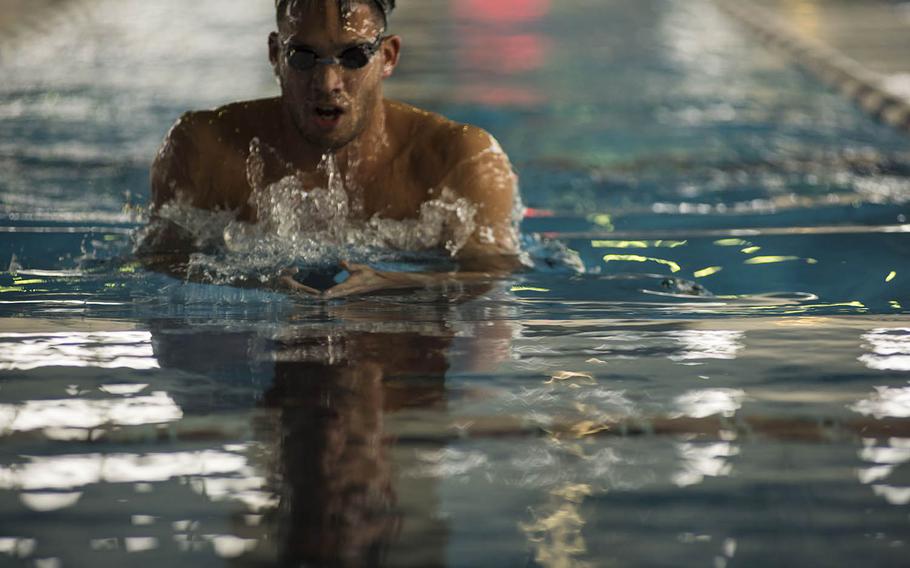
Shotaro Shimazaki, 27, a swimming instructor at Yokota Air Base, Japan, is a competitive breaststroker who plans to enter trials that will determine who competes for Japan at the summer games in Tokyo. (Theron Godbold/Stars and Stripes)
YOKOTA AIR BASE, Japan — One second separates a swimming instructor at the home of U.S. Forces Japan in western Tokyo from his dream of representing Japan at next year’s Olympic Games.
Shotaro Shimazaki, 27, of Ome, Japan, has been swimming since age 6 and teaches intermediate and expert adult swim classes at the Yokota Natatorium.
The speedster doesn’t brag, according to his colleagues, but he’s a competitive breaststroker and plans to enter trials in April that will determine who competes for Japan at the summer games in Tokyo.
To be selected, Shimazaki, ranked 16th in Japan for 100-meter-breaststroke based on this year’s results, will need to be one of the fastest two swimmers at the National Swimming Championships and clock a 100-meter time of under 59.21 seconds, according to information provided by the Japan Swimming Federation.
Right now, he’s swimming the distance in about a minute flat, he said during a Dec. 9 interview.
“If I can drop one second, I’ll make the team,” he said.
Shimazaki hoped to enter the Olympics for the first time this year but the trials and the games were postponed due to the coronavirus pandemic.
Olympic organizers and Japanese officials say the games will start July 23, 2021, despite recent polling that suggests most Japanese people want the event canceled or postponed again.
As a youngster, Shimazaki competed for the Central Fussa Swim Team, in the city that borders Yokota’s main gate.
“My teammate was a breaststroker,” he recalled. “He was a few years older than I was and I felt that breaststroke was so cool.”
Keiko Aso, 54, coached Shimazaki for three years in high school. During a phone interview Tuesday, she said Shimazaki has a great build for the sport.
“He had a natural aptitude as a swimmer but didn’t have the motivation,” she said.
But, after competing at the junior level, Shimazaki’s attitude changed and he started talking about the Olympics, Aso said.
“I have hopes for him since he has accomplished, no matter what, when he decided to do so,” she said.
The young athlete trains 90 minutes a day, five or six days a week, mostly at Yokota in preparation for trials at the newly built Tokyo Aquatic Center, where the Olympic events will take place, Shimazaki said.
“I swam there last week. Everything is big and there are huge stands and monitors,” he said, adding that the water in the pool is very smooth.
He fuels himself for training with Japanese food such as rice and natto, a sticky fermented bean, he said.
Shimazaki is popular with swimmers at Yokota and the parents of the 160 kids who take lessons at the Natatorium, according to base aquatics director Jason Fay.
“When I started working with him I didn’t realize he was trying out for the Olympics,” he said. “He didn’t mention it and I heard it from other staff.”
Swimming is a great sport for kids, Shimazaki said.
“It’s good for fitness but they also learn to survive if they fall in the sea or a river,” he said.
Lately, however, he has been focused on teaching 15 adult expert and intermediate swimmers to improve their breaststroke times. He tracks their progress on a chart that shows their improvement from week to week.
Competitive breaststrokers must breath every stroke, but Shimazaki said he can swim the length of an Olympic 50-meter pool underwater.
A common problem among the recreational breaststrokers is improper leg technique, he said.
“The legs are the most important,” he said, demonstrating how they should be kicked in the correct manner to generate power through the water.
In summer, Shimazaki goes to Shimoda Beach in Shizuoka prefecture, south of Tokyo, but doesn’t try to impress people there with his breaststroking and just enjoys the sun and the sand, he said.
Even if he doesn’t make the Olympic team, Shimazaki said he’s excited about the games coming to Tokyo and hopes to watch Japan’s baseball team compete.
robson.seth@stripes.com Twitter: @SethRobson1
kusumoto.hana@stripes.com Twitter: @HanaKusumoto